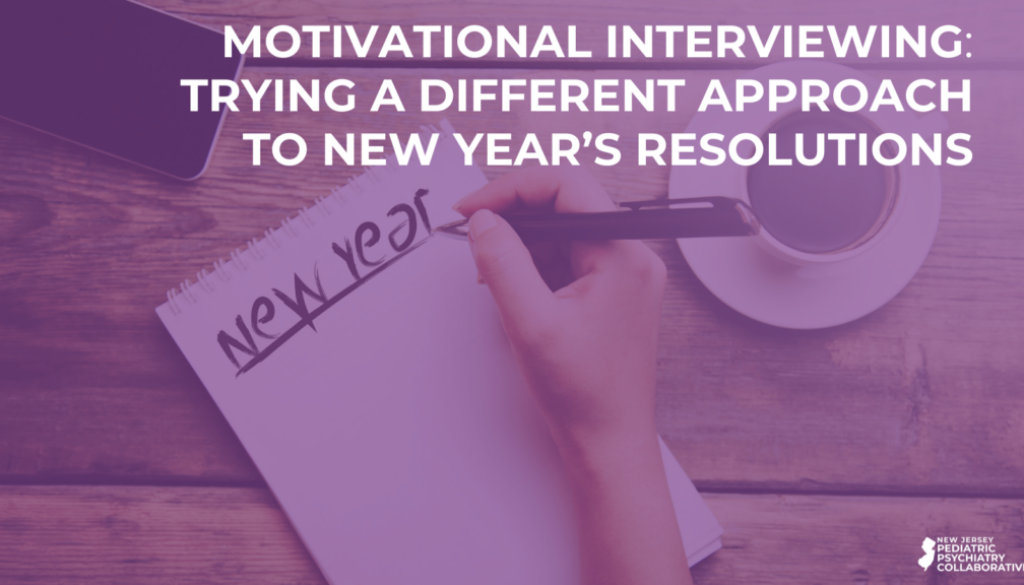Motivational Interviewing in Pediatric Primary Care: Trying a Different Approach to New Year’s Resolutions
By Debra E. Koss, MD
With the holiday season behind us, we can focus on the opportunities ahead in 2025. This is a time when many of us set New Year’s resolutions, yet remaining committed to change and reaching our goals can be difficult. Setting goals that are realistic and attainable, and maintaining motivation for action, are keys to success. Families may also use the New Year to initiate a conversation about healthy goals with their children and teens. Working together to achieve a shared goal, such as every family member avoiding phones and screen time during dinner, may lead to greater success. However, children and adolescents must be encouraged to find their own desire for change. Pediatric primary care providers utilizing motivational interviewing techniques are in a unique position to support children and adolescents in their efforts.
Motivational interviewing is a collaborative and goal-oriented type of communication that fosters an equal partnership between a pediatric provider and a patient. The clinician listens for change talk, that is any statement made by a patient that indicates a desire, ability, reason, or need to change a behavior. The clinician maintains a curious and empathic stance and seeks to empower the patient to identify their own capacity for change. The clinician does not offer unsolicited advice, instruct the patient on choosing goals, or confront the patient about ambivalence or resistance to change.
Motivational interviewing has four core skills (OARS):
- Open-ended question (O): Clinicians ask open-ended questions that encourage patients to provide detailed responses about thoughts and feelings instead of simple yes/no responses. Examples of open-ended questions include “Can you tell me more about…” or “What do you want to do about…”.
- Affirmation (A): The clinician offers positive statements that highlight a person’s strengths, efforts, and past success. An example of an affirmation is “I appreciate how hard you’re working on…”
- Reflective listening (R): The clinician uses reflective listening to demonstrate that they understand and have empathy for the patient. A clinician using reflective listening may repeat or rephrase what the patient is trying to communicate. Examples include “It seems like you’re feeling overwhelmed when…” or “It seems like the biggest obstacle to change is…”.
- Summary (S): By summarizing, the clinician briefly recaps key points of the exchange to ensure clarity and understanding with the patient. An example may start with “To summarize, you’re…Is that accurate?”
Motivational interviewing may be especially well suited to communicating with adolescents who often engage in impulsive behavior, struggle with confidence in their own abilities, and seek greater autonomy. Parents who accompany adolescents to pediatric visits may report concerns about grades, poor sleep, excessive use of screen time, or sibling conflict. Parents of teens with mental health or substance use disorders may have specific concerns about high-risk behaviors such as self-injurious behavior or substance use. The clinician must be aware of aligning with the parent and excluding the adolescent. The clinician may utilize the OARS approach to engage the adolescent and elicit their desire, ability, reason, or need to change.
Let’s consider an example in which the identified concern is marijuana use. An example of motivational interviewing using OARS could be: “Can you tell me more about what challenges you face when using marijuana?” (Open-ended question) – It sounds like you’re really motivated to improve your health and maintain your spot on the team roster, and you’ve already tried a few different approaches, which is great.” (Affirmation) – “It seems like the biggest obstacle to cutting back is spending time with a group of friends who are all using marijuana.” (Reflection) – “So, to summarize, you’re aware of the benefits of decreasing your marijuana use, and you’ve attempted to make changes, but spending time with friends who use is a major hurdle. Is that accurate?” (Summary)
Engaging and empowering patients to change behaviors utilizing motivational interviewing skills can make a difference. I hope you’ll consider incorporating OARS in your next patient evaluation.
Author Profile:


Debra E. Koss, MD
Clinical Assistant Professor, Department of Psychiatry Rutgers-RWJMS
NJPPC Project Manager for the New Jersey Psychiatric Association
References
- American Academy of Pediatrics (2021) Motivational Interviewing https://www.aap.org/en/patient-care/mental-health-initiatives/mental-health-education-and-training/motivational-interviewing/?srsltid=AfmBOoqMRQFO6UaDhINpV5FPwqrY3Ojd-V99sTG5bz115RUH5BQYwqee
- Douaihy A, Kelly T, Gold M. (2023) Motivational Interviewing: A Guide for Medical Trainees (2nd Edition). Oxford Press.
- Miller, W.R. & Rollnick, S. (2013) Motivational Interviewing: Helping people to change (3rd Edition). Guilford Press.
- Wilkins F, Morrissey C. (2024, October 3) What is Motivational Interviewing? https://childmind.org/article/what-is-motivational-interviewing/




